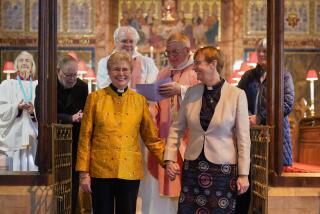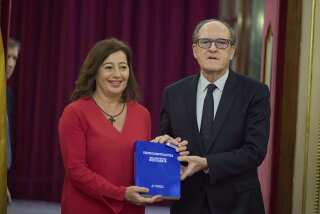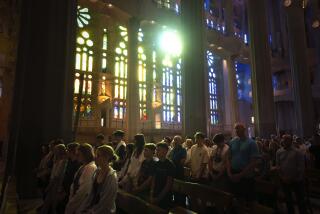Church Loses Grip on Spanish Mores, So Now It’s Sancho Bar the Door
- Share via
MADRID — Don Quixote, thwarted by a priest in one of his knightly adventures, complained to his sidekick: “Sancho, we have come up against the Church.”
For 1,300 years, Spaniards have come up against the Roman Catholic Church as the stern arbiter of morals, beliefs and politics. Spaniards still use Don Quixote’s words as a catch-phrase for the vast powers long wielded by the clergy that, until just 12 years ago, sat in the parliament.
But today, in the country’s new secular mood, the church is fast losing its sway.
“Our guidelines to society are, quite simply, falling into a void,” Cardinal Angel Suquia, Archbishop of Madrid, told a bishops’ conference in April.
“In the last 20 years, church doctrines have entered a long eclipse.”
Modern Spain’s Changes
Here are some ways in which modern Spain has changed:
* Beyond baptism, marriage and burial, 77% of Spaniards rarely or never go to church, a recent church-sponsored survey showed.
* Premarital sex is acceptable, according to 82% of under-21-year-olds polled.
* Even most practicing Catholics do not believe in heaven or in the Pope’s infallibility, two basic tenets of Catholic dogma, according to a poll in the news weekly Cambio 16.
* Just 23% of regular churchgoers obey the Vatican’s strictures on birth control. A startling decline in birth rates, from Europe’s highest in 1974, now places Spain on a par with the two-children families of Protestant countries.
“For a country that spawned the Inquisition and even fought a civil war in this century in defense of the faith, the change is nothing short of revolutionary,” sociologist Carlos Malo de Molina said. “It happened gently, but in 10 or 15 years Spain turned into one of Europe’s most tolerant countries.”
The most decisive blow to church authority came 10 years ago when, emerging from the 37-year dictatorship of Francisco Franco, Spain drew up a democratic constitution that separated church and state. Except for a brief period in the 1930s, Roman Catholicism had been Spain’s official religion since AD 587.
Legislation Welcomed
Church fathers looked on numbly as the vast majority of Spaniards welcomed a rush of legislation allowing divorce, abortion, civil marriages and birth control.
The last of Spain’s religion-inspired laws--jail terms for blasphemy and public nudity--will be scrapped this spring.
Franco boasted that Spain was the “spiritual reserve of the West” and referred to the 1936-39 Civil War that brought him to power as “La Cruzada,” after the Christian crusades of the Middle Ages.
Spain’s leading Catholic philosopher, Jose Luis Aranguren, said he regards the relatively silent leave-taking of the church from politics after Franco’s death in 1975 as a “healthy sign, finally putting to rest centuries of religious intolerance” in Spain.
“By the time of the new constitution, even devout Catholics were weary of church meddling in state affairs,” he said.
But skirmishes still emerge.
Church officials are battling educational reforms, set in motion in 1984 by the ruling Socialists, which require state-aided schools to submit curriculum and textbooks for official approval. A third of Spain’s 8 million school-age children attend church-run schools that receive state funds.
In a heated “war of the catechisms” with the education ministry, the church was forced to withdraw a parochial school text that equated abortion with terrorism.
On the Socialist side, the government accused bishops of opening old wounds by seeking to have three Spanish Carmelite nuns, killed by anti-Franco militia in 1936, beatified as “the first Roman Catholic martyrs of the Civil War.” The government boycotted their beatification ceremony at the Vatican in March, 1987.
But the Socialists continue to give the church a large stipend--$118.2 million last year--which covers about a fourth of its expenses, including salaries for 21,200 diocesan priests.
In June, however, a so-called “religious tax” aimed at easing church dependence on state funds will be introduced.
Taxpayers will be asked to earmark 1/2% of their payments either to the church or to nonsectarian charities. A bishops’ poll in April indicated that 40% of taxpayers planned to choose the church. Other surveys estimated less than 30%.
But for all their rejection of church authority, most Spaniards still think of themselves as belonging to the Vatican’s fold.
A survey of the nation’s piety published in April in the news weekly El Globo showed that 90% of those polled view themselves as Catholics, if only sentimentally.
“They don’t practice, but they believe in God--if only to cover their tracks,” the magazine said. “They married in the church because mother asked them to, and they baptized their children to avoid family disputes.”
Protestant faiths, barred from proselytizing under Franco, have failed to make much headway in the last decade. Of a population of 39 million, just 200,000 Spaniards are members of non-Catholic churches.
Noting Spain’s ambivalence toward Catholicism, historian Fernando Diaz-Plaja quoted the response of a shoe-shine man in Seville to a Protestant preacher’s attempts to convert him:
“If I don’t believe in my own religion, which is the true one, how am I going to believe in yours?”
More to Read
Sign up for Essential California
The most important California stories and recommendations in your inbox every morning.
You may occasionally receive promotional content from the Los Angeles Times.













